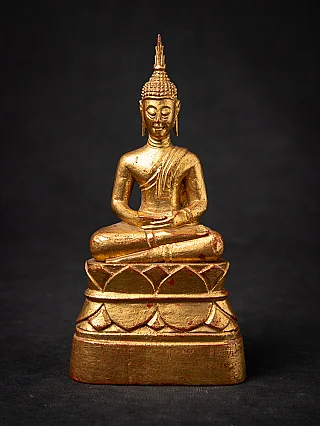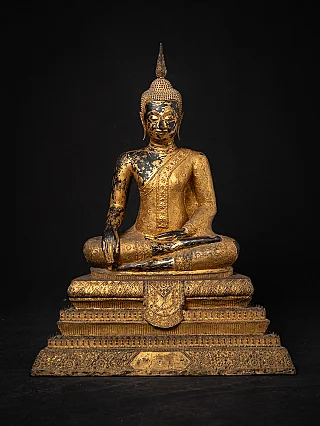The Kings of Ayutthaya
Author : Peter Vredeveld

Ayutthaya was once known as the largest and most beautiful city in the world.
Ayutthaya Kingdom, the second Siamese Kingdom, existed from the 14th century to the 18th century and is renowned for its colossal monasteries and prang (reliquary towers). The name "Ayutthaya" was derived from the ancient Indian city "Ayodhya." It became one of the world's largest and most cosmopolitan urban areas and served as a hub for diplomacy and commercial trade. Foreign traders were always welcomed into the Ayutthaya kingdom, making it a center for trade with Chinese, Vietnamese, Indians, Persians, and Japanese. During the 16th century, Ayutthaya Kingdom became one of the biggest and wealthiest cities in the East, providing shelter to Portuguese, Dutch, Spanish, and French traders outside the capital's walls. The Ayutthaya Kingdom was located on an island surrounded by three rivers, connected to the sea, making it strategically central for foreign trade and diplomacy. Even the ambassadors of France during King Louis XIV's reign compared the kingdom of Ayutthaya to Paris in terms of wealth and size. It was stated that the court of King Narai had strong links with King Louis XIV to boost trading potency.
Kings of Ayutthaya

During the time of Ayutthaya Kingdom, the kings were semi-religious monarchs who followed various ideologies of both Hinduism and Buddhism. The prevailing religion in Ayutthaya Kingdom was Theravada Buddhism, but according to Hindu tradition, the kings were seen as avatars of Lord Vishnu, born to protect the people from demons. According to Buddhism, the king was known as a righteous ruler whose aim was to fulfill the well-being of the people by strictly following the teachings of Lord Buddha.
The Ayutthaya Kingdom was initially ruled by the 1st Uthong Dynasty, which lasted from 1350-1370. The first king of Ayutthaya was Somdet Phra Chao Uthong, also known as Somdet Phra Ramathibodi I. Ramathibodi I secured his position as king through political marriages and alliances. After his death, a conflict over succession ensued, eventually leading to his son Somdet Phra Ramesuan taking over, but he was later abducted, causing a civil war.
After overthrowing the Uthong dynasty and taking the throne of the Ayutthaya Kingdom from King Ramesuan, the Lord of Suphanburi became the third king of Ayutthaya, starting the Suphannaphum Dynasty in 1370. Somdet Phra Borommarachathirat I, also known as Khun Luang Pha Ngua, reigned over the kingdom for 18 years and expanded it to the north. He defeated various northern powers of Phitsanuloke and subdued the rebellion in the Sukothai Kingdom. However, his army was defeated while invading Chiang Mai. The second king of the Suphannaphum Dynasty and the fourth king of Ayutthaya Kingdom was Somdet Phrachao Thonglan, whose reign lasted only a week before he was executed.
After being deposed by King Somdet Phra Borommarachathirat I, King Ramesuan, with sufficient support and power, took the throne again after executing the 17-year-old Thonglan. During his second reign, King Ramesuan captured Chiang Mai, the capital of Lan Na.
Here are the Kings of the different dynasty that ruled the Ayutthaya Kingdom during the 14th century to 18th century.
- Uthong Dynasty .
- Somdet Phra Chao Uthong (Ramathibodi I)
- Somdet Phra Ramesuan (First Reign) (Second Reign)
- Somdet Phra Rama Ratchathirat (Second Reign)
- Suphannaphum Dynasty
- Somdet Phra Borommarachathirat I
- Somdet Phrachao Thong Lan
- Somdet Phra Intha Racha I
- Somdet Phra Borommarachathirat II
- Somdet Phra Boromma Trailokanat
- SukoThai Dynasty
- Somdet Phra Maha Thammarachathirat
- Somdet Phra Naresuan The Great
- Somdet Phra Ekathotsarot
- Somdet Phra Si Saowaphak
- Prasat Thong Dynasty
- Somdet Phrachao Prasat Thong
- Somdet Chao Fa Chai
- Somdet Phra Si Suthammaracha
- Somdet Phra Narai The Great
- Ban Phlu Luang Dynasty
- Somdet Phra Phetracha
- Somdet Phra Suriyenthathibodi
- Somdet Phra Chao Yu Hua Thai Sa
During the reign of these dynasties, the Ayutthaya Kingdom was known as one of the largest and most beautiful cities in the world. However, in 1767, a final Burmese invasion nearly destroyed the city, and the kingdom was left desolate. The treasures and much of the population of the Ayutthaya Kingdom moved to Burma. Nevertheless, the temples and palaces of the kingdom still stand, some of which remain spectacular landmarks in Southeast Asia.
Ayutthaya Buddha Statues
In the past 400 years, many kings ruled one of the largest and most beautiful cities in the world during that time. Approximately 33 kings from different dynasties ruled this kingdom and contributed to its beauty until its total destruction. In the span of 417 years, the kingdom was adorned with beautiful monasteries, pagodas, Buddha statues, Buddhist temples and palaces.
The Prasat Thong Dynasty had a significant influence in creating beautiful structures in this ancient kingdom. The first king of the Prasat Thong Dynasty, King Prasat Thong, constructed Wat Chaiwatthanaram, one of the magnificent Buddhist temples that lies in the city of Ayutthaya Kingdom. The temple's name means "The Temple of Long Reign and Glorious Era." Wat Chaiwatthanaram is built in the Khmer architectural style and features a 35-meter-high prang with four other similar prangs. The entire structure is situated on a rectangular platform and is surrounded by eight chedi-shaped chapels. These chapels are unique, with various paintings on their interior walls and 12 reliefs depicting scenes from the life of Lord Buddha, which should be read clockwise. During the same dynasty, King Narai the Great, also known as Ramathibodi III, constructed Wat Kudi Duo, a Buddhist temple that was later restored by King Thai Sa of the Ban Phlu Luang Dynasty. This temple was constructed in late Ayutthaya style and features the Ubosot (ordination hall), the Viharn (image hall), the bell-shaped principle Chedi in Sri Lankan style, and more.
The first king who initiated the Ayutthaya Kingdom, King U-thong, also constructed Wat Yai Chai Mongkhon, a Buddhist temple built to accommodate monks. Other important Buddhist temples constructed during the Ayutthaya Kingdom's existence include Wat Ratchburana, Wat Phanan Choeng, Wat Phra Si Sanphet, and Wat Tuek Temple, which is still active today. Wat Tuek Temple consists of two sermon halls, and the Ubosot in the temple houses a large number of Buddha images in various poses. Several modern shrines serve as monuments to Buddha, monks, and some modern Hindu deities.
Wat Ratchburana was founded by King Borommarachathirat II of the Suphannaphum Dynasty. The temple's main prang is one of the finest in the city and contains a rare example from the early Ayutthaya period. It also houses numerous Buddha images, gold artifacts, and the Chao Sam Phraya Museum, showcasing influences from both Khmer and Sukhothai styles.
The monastic architecture of Wat Phra Si Sanphet was aligned on an east-west axis, with the core of the temple featuring three identical chedis constructed on a rectangular platform. These three chedis were built in the Sukhothai style, influenced by Srivijayan Stupa. They were constructed by three kings: King Ramathibodi II, King Borommaracha III, and King Boromracha IV.
Despite the invasion by the Burmese army, many Buddha statues and temples were destroyed, but various structures still stand, such as Wat Mahathat, where you can see a Buddha head overgrown with trees.
Share this page












































